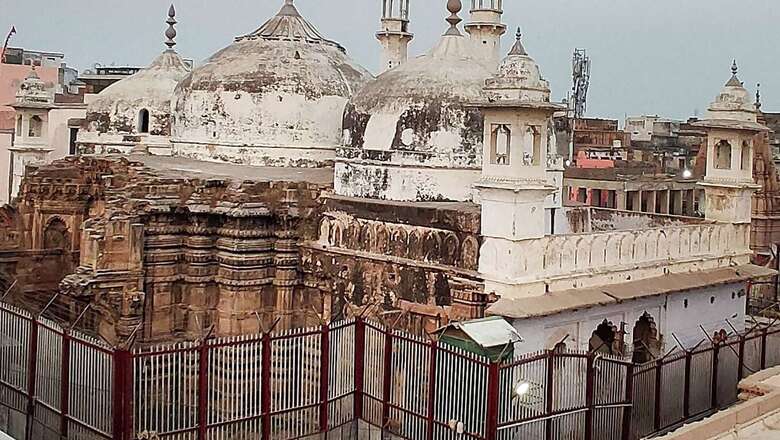
views
The Varanasi district court will give the order today in the Gyanvapi mosque row on whether to invite opposition to the survey report or start hearing the petition filed by the mosque committee. The Gyanvapi mosque management committee (Anjuman Intezamiya Masjid) contends that the civil suit is barred under the Places of Worship Act but Hindu petitioners want that the survey report be reconsidered.
The court had ordered the survey earlier on a plea by five women seeking permission to perform daily worship of some idols located on the western wall of the mosque. The mosque management committee approached the court for the appointment of another advocate as the court commissioner, accusing Mishra of favouring Hindu petitioners in his court-mandated task.
Ajay Kumar Mishra, the court commissioner for the survey, and lawyers representing both the Hindu and Muslim sides had on Saturday gone inside the Gyanvapi-Shringar Gauri temple complex. Despite waiting for nearly two hours inside the complex, they had not been able to accomplish the work and had to come out of the complex. Counsel Vishnu Jain, representing the five women petitioners, too had gone inside the complex with Mishra on Saturday. After emerging from there, he had told reporters that men present inside the mosque did not allow the survey team to enter the mosque area to conduct the survey. He had also accused the district administration of not helping the court commissioner’s team in entering the mosque.
Here’s a Timeline of the Row Around Varanasi’s Gyanvapi & What Petitioners Want
Muslim side presented their arguments on May 23, and said the matter doesn’t meet the parameters of the Places of Worship Act. They wanted the matter dismissed, said advocate Madan Mohan Yadav in Varanasi. “But we too presented our arguments before the court”, he said.
On May 20, the Supreme Court transferred the trial of case in which Hindu parties have sought permission to pray at Shringar Gauri and in Gyanvapi complex from civil judge court to district judge court in Varanasi.
The sensitive video-graphic survey and inspection of the Maa Shringar Gauri Sthal at the Kashi Vishwanath-Gyanvapi complex in Varanasi was scheduled to be done on May 6 and 7 but couldn’t be completed due to protest by Muslims.
The issue first made proper news in 1991, when a slew of petitions arrived before the Varanasi court; local priests had petitioned for permission to worship in the Gyanvapi Masjid area.
The petitioners claimed that the Gyanvapi Masjid was built on orders of Mughal king Aurangzeb in the 17th century by removing a portion of the Kashi Vishwanath Mandir.
One of these petitioners was Vijay Shankar Rastogi, a lawyer from Varanasi, who filed a plea in the lower court as the “next friend” of the Kashi Vishwanath Mandir’s presiding deity. In legal language, a “next friend” is someone who represents someone who is unable to represent themselves in court.
The petition was submitted in 1991 and Rastogi argued in his petition that Maharaja Vikramaditya built the temple where the current mosque stands roughly 2,050 years ago. He urged that the Gyanvapi mosque be demolished and that Hindus be granted ownership of the entire plot of land, as well as the right to worship inside the mosque.
Furthermore, the petitioner argued that because the Gyanvapi mosque was erected upon a partially ruined temple, the Places of Worship (Special Provisions) Act, 1991 did not apply.
Following the proceedings in 1997, a trial court in Varanasi ruled that the petitioners’ redress was restricted by the Places of Worship (Special Provisions) Act, 1991. Following that, revision petitions were filed, consolidated, and heard in Varanasi’s trial court, according to a report by Jagran Josh.
The AIM Committee filed a petition in the Allahabad High Court in 1998, claiming that the matter could not be resolved by a civil court and citing Section 4 of the Places of Worship (Special Provisions) Act, 1991. Following this, the Allahabad High Court issued a stay order on the civil court’s proceedings.
Prime Minister Narendra Modi lay the foundation stone for the Kashi Vishwanath temple corridor in March 2019. A contractor removed chabootra near gate number 4 of the Gyanvapi mosque as part of the corridor construction in October 2019, escalating communal tensions in the neighbourhood. The contractor, however, built the shattered building overnight after local Muslims protested, the report said.
Advocate Vijay Shankar Rastogi filed a new petition on behalf of the Swayambhu Jyotirlinga Bhagwan Vishweshwar seeking an archaeological assessment of the Gyanvapi mosque in December 2019, a month after the Supreme Court’s decision on the Babri Masjid-Ram Janmabhoomi controversy. He noted that in 1998, it was ordered to gather evidence from the entire Gyanvapi complex in order to determine the site’s religious character, but the Allahabad High Court postponed the lower court’s decision.
In the current case, Rakhi Singh, Laxmi Devi, Sita Sahu, Manju Vyas, and Rekha Pathak of Delhi had filed a lawsuit on April 18, 2021, seeking permission to worship and perform rituals at Shringar Gauri, Lord Ganesh, Lord Hanuman, and Nandi on a daily basis, as well as preventing opponents from damaging the statues.
Within the very sensitive Gyanvapi mosque’s exterior wall is a picture of Goddess Shringar Gauri. Regular access of devotees was stopped after the mosque’s security was tightened up following the demolition of the Babri mosque during the Ram Janmabhoomi movement, and worshipping this deity was only allowed on the fourth day of Chaitra Navratra.
In the Shringar Gauri worship case, the court of Civil Judge (Senior Division) of Varanasi, Ravi Kumar Diwakar, had on April 26, 2022 ordered videography by the advocate commissioner of the Shringar Gauri temple in the Kashi Vishwanath-Gyanvapi mosque complex and other places after Eid and before May 10.
The court had said that besides the advocate commissioner and parties, one associate can remain present during the proceedings.
Read all the Latest India News here




















Comments
0 comment